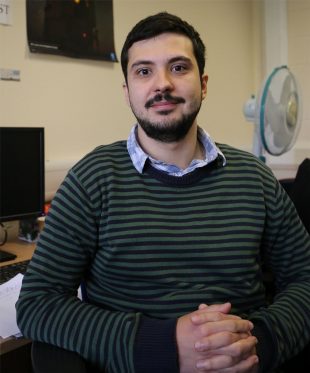Astronomy PhD student Robert Pomohaci, gets starry eyed over his 3 months as a RCUK policy intern at the Government Office for Science.
My research focuses on observing Massive Young Stellar Objects (MYSOs) with near-infrared spectroscopy and imaging in order to understand how high-mass stars form. Stars bigger than 8 times the mass of the Sun shape our Galaxy through the intense stellar winds they create. They are a furnace in which all elements heavier than carbon are created. However their fast evolution and relative scarcity compared to solar-mass stars makes their formation difficult to observe and understand.
Understanding high-mass star formation will help us unlock the past and future of stellar populations in the galaxy which underpin most of the assumptions of astronomy and cosmology.

Back down on earth
I have always been interested in how Government works, how it forms policy and how science fits with this. So when the opportunity of a Research Council UK (RCUK) funded placement at the Government Office for Science (GO-Science) presented itself, I was quick to apply.
During my time at GO-Science, I worked in the Foresight team, scoping out new projects.
This was a rewarding experience that involved investigating emerging trends and drivers and their impact on future policy.
Before my placement I didn't realise how many scientists work within Government (up to 30,000) and the important role played by staff in GO-Science. Although temporary, from my first day to my last I significantly shaped the direction of the project. The pace of work is quite different to that of academic research and I improved many of my skills, from taking efficient notes to project management.
GO-Science is a great place to work in, with many learning and personal development opportunities such as workshops or the Civil Service Learning courses. Its small size (~60 staff) makes it very friendly and welcoming and there is a strong intern network.
Skills for life
While the work of my PhD and that of GO-Science are not directly related, I have acquired many useful skills during my internship. Particularly, I am applying the project management tools I learned in GO-Science in managing my thesis write-up period. The placement helped me understand what roles are available for scientists in Government, and indeed this is one of the career avenues I am now considering after I finish my degree.
I am very grateful for the stellar opportunity to work at GO-Science, and would highly recommend this scheme to any PhD students as a great learning experience. If you are interested in joining the scheme, the call for 2018 placements will be open between 19th of June – 10th of August 2017. More information and details of how to apply can be found on the RCUK website.
Keep up to date with the GSE profession’s work by signing up for email alerts.
Featured image by WikiImages, used under Creative Commons Licence







